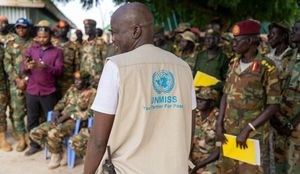Negotiations for a ceasefire between Israel and Hezbollah are reportedly gaining traction, with expectations of progress within the next 36 hours. Sources from Lebanon indicate a deal, mediated primarily by the United States, is poised for approval by the Israeli cabinet following their vote on the proposal.
Recent developments depict a precarious situation where Israeli airstrikes have doubled down on targets in Beirut, and Hezbollah rockets continue to bombard northern Israel. Despite these violent exchanges, diplomatic efforts have surged, with key global leaders coming together to facilitate peace talks.
According to Lebanese officials, the proposed arrangement would see Israel withdraw its troops from southern Lebanon, paving the way for the Lebanese army to take up positions along the border. This possible troop movement might quell tensions and draw the curtain on what has been weeks of ferocious conflict, which erupted dramatically at the end of September.
U.S. officials have expressed cautious optimism, declaring, "We believe we are close to finalizing" the ceasefire deal. This upbeat assessment aligns with reports from various European and UN diplomats actively engaged on the ground, striving for the cessation of hostilities.
Hezbollah has shown considerable commitment to the talks, emphasizing the need for Israel’s withdrawal as one of their key demands. The fight, from their perspective, is not merely about land but also the protection of Lebanese sovereignty against foreign incursions. The American mediation appears to focus on ensuring both parties' needs are addressed adequately to forge lasting peace.
The history of conflict between Israel and Hezbollah stretches back decades, characterized by periodic escalations and frail truces. The recent escalation, which has included ground invasions and airstrikes, point to the seriousness of the situation and the necessity of firmer, more sustainable resolutions.
Officials from Israel's security cabinet are set to make significant decisions on this matter this week. The consensus required can be challenging to achieve, particularly with varied opinions on how to respond to Hezbollah's advances and Israel's strategic interests.
The Hezbollah-Israel conflict is multifaceted and heavily influenced by regional politics and international relations. Analysts suggest any decision taken by Israel's cabinet will not only affect its immediate security concerns but also influence regional dynamics, especially concerning Iran’s role as Hezbollah’s primary supporter.
Heavy fighting, including Israeli airstrikes on Hezbollah positions, continues to dampen the hopes of secure negotiations. Israeli Prime Minister Benjamin Netanyahu's cabinet faces substantial pressure from both military leaders advocating for continued aggression and diplomatic officials pushing for ceasefire negotiations. With recent airstrikes resulting in casualties, maintaining internal unity on the approach to Hezbollah is increasingly difficult.
Netanyahu himself has faced criticism for how he has handled the situation, with some factions within Israel favoring a harsher stance against Hezbollah. Conversely, others justify negotiations citing the potential costs of prolonged conflict, which include civilian casualties and destabilization across the northern border.
International voices have chimed in, with French President Emmanuel Macron and U.S. President Joe Biden advocating for concluding these protracted hostilities. Macron emphasized the importance of protecting civilians from the impact of military operations and the need for humanitarian assistance to reach those affected.
The humanitarian situation is of grave concern, and many civilian lives have been disrupted amid the military operations. Areas along the Israel-Lebanon border have seen significant displacements with vulnerable populations facing severe shortages of food, electricity, and access to healthcare.
Reaching agreement on the ceasefire terms remains imminent, with reports indicating Lebanon and Israel are both eager to secure long-term stability. Observations from neutral parties advocating for peace suggest interim measures may be necessary if final terms are delayed.
Peace negotiations often face skepticism and opposition from militant factions on both sides, which may alter the course of dialogue. The situation remains fluid, and any sign of weakening commitment by either party could shatter hopes for ceasefire.
The participation of world powers like the U.S. and EU could play a pivotal role as the timeline edges closer to the ceasefire decision. Heightening political stakes for the involved leaders add pressure to act swiftly and sensibly as they navigate through fragile diplomatic waters.
This potential ceasefire, if upheld, can represent not merely the end of hostilities but also may set the stage for future discussions on borders and mutual respect for territorial claims. Observers express hope it could lead to greater regional security, benefiting civilians who long for security and stability.
What remains clear is the urgency to put down arms and reach dialogue, for without it, civilians bear the brunt of the conflict. It’s their lives, their homes, and their futures all tied to the decisions of those wielding power across the negotiating table. The world watches and waits for the Israeli cabinet's final verdict, as immediate ramifications of their decision could echo throughout Lebanon and the broader region.
Should the ceasefire initiative materialize successfully, it can lead to de-escalation and potentially normalize relations between Lebanon and Israel over time. Failure to achieve peace could perpetuate the bloodshed and cyclical violence characteristic of the region’s history.
While the details of the ceasefire plan are still being hammered out, the international community remains hopeful for enduring peace, having witnessed too many conflicts deteriorate due to procrastination at the negotiating table.



